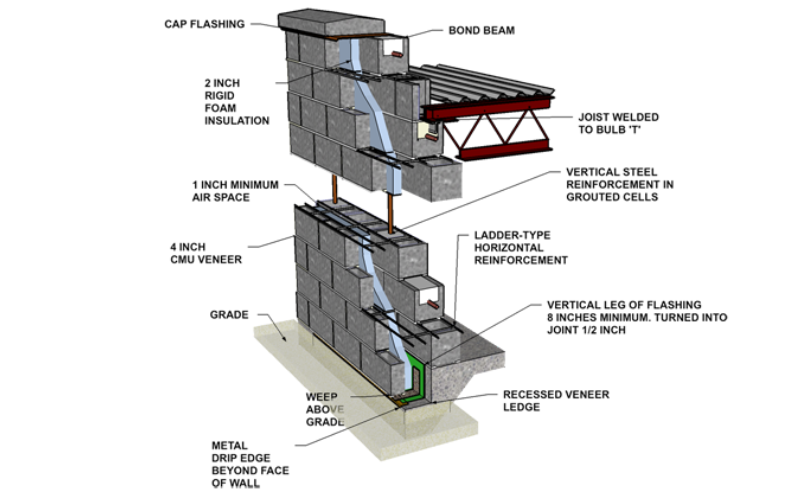PL: BECS has long-term, wide-ranging expertise in masonry structures whose exterior walls consist of structural brick, concrete block masonry, or structural concrete. Direct experience with analyzing numerous problems, such as infiltration and stress-cracking, has been fully incorporated into PL: BECS recommendations concerning the design and construction of new structures. Comprehensive familiarity with masonry construction has also allowed PL: BECS to serve as an expert witness and arbitrator in resolving masonry-related disputes.
Exploring Masonry Wall Systems
Traditional Masonry Construction
Traditional masonry construction uses bricks or stones individually laid and held together with mortar. This tried and true method boasts exceptional toughness, thermal insulation, and fire resistance. Brick walls have been used for centuries because of their durability and the classic style they give to any structure.
Concrete Masonry Units (CMU)
Concrete blocks, also known as concrete masonry units (CMU), are precast concrete building blocks. The variety of sizes and shapes available in these blocks allows for greater freedom in layout. Walls made of concrete masonry are often used in commercial and residential construction because of the material’s durability, thermal insulation, and fire- and moisture resistance.
Reinforced Masonry Walls
Reinforced masonry walls provide the longevity of masonry and the strength of concrete. Steel reinforcement is embedded in masonry units or mortar joints to improve the structural integrity of a wall. Because of their exceptional load-bearing capabilities, reinforced masonry walls are widely used for high-rise buildings, retaining walls, and other structures.
The Benefits of Exterior Structural Concrete & Masonry Wall Systems
- Strength and Durability: Exterior structural concrete and masonry wall systems are renowned for their strength and durability. They can withstand heavy loads, inclement weather and time without breaking. These methods of construction ensure the structural integrity of buildings and reduce the need for maintenance and repairs over time.
- Fire Resistance: When it comes to this important aspect of the building, exterior structural concrete and masonry wall solutions really shine. Concrete and masonry are the most effective fire barriers because of their inherent resistance to the spread of flames and heat. This helps keep people inside the building safe during a fire and prevents the spread of fire.
- Thermal Efficiency: Exterior structural concrete and masonry wall systems are also advantageous because of their high thermal efficiency. Concrete and masonry have a high thermal mass, which makes them excellent heat storage and release materials. This feature helps maintain a comfortable indoor climate, thereby reducing the load on the HVAC system and saving money.
- Design Flexibility: Exterior structural concrete and masonry wall systems allow for exceptional architectural freedom, allowing architects and builders to create structures with unique forms, textures, and finishes. Because of their versatility, concrete, and masonry can be used to create a variety of architectural styles, guaranteeing that the building’s exterior will reflect the intended aesthetic. These can take many forms, from simple paint jobs to elaborate murals.

